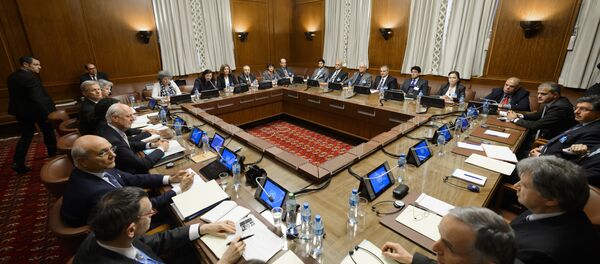It is no secret that the world's oil-dependent economies are facing temporary difficulties due to the current slump in the price of the commodity. Saudi Arabia has one-fifth of the world's proven oil reserves. An influential OPEC player, Riyadh could halt the slump simply by reducing its oil output.
On the other hand, Saudi Arabia is involved up to its eyeballs in the Syrian crisis. Besides sponsoring Sunni Islamists in the region, Riyadh has created the so-called High Negotiations Committee (HNC) to bring together various jihadi groups fighting against Bashar al-Assad in Syria.
"It's worth noting, that the Saudis created the HNC to lump the many disparate militias operating in Syria under one pretentious-sounding moniker that lends legitimacy to the roving bands of Sunni militants that most people consider terrorists," Whitney narrates in his article for CounterPunch.org.
Ahead of the Geneva peace negotiations the Saudi protégés have even gone so far as to claim that they would not participate in the talks until Russia meets their demands for "humanitarian relief," prisoner release and stopping the bombing of enemy positions.
Saudi Arabia is especially interested in halting the Russo-Syrian advance. It is no secret that Riyadh wants to topple Syrian legitimate president Bashar al-Assad.
"If oil can serve to bring peace in Syria, I don't see how Saudi Arabia would back away from trying to reach a deal," a Saudi diplomat remarked, as quoted by The New York Times.
In light of this, it seems quite possible that Riyadh will make an attempt to use its oil price card in order to pressure Russia into stepping aside and abandoning the Syrian President.
However, the question arises whether Russia will swallow the bait.
"It would be a huge change, and to me, this is an unlikely scenario," Angela E. Stent, former US senior national intelligence officer who focused on Russia, told The New York Times, commenting on the issue.
At the same time, it is not in Riyadh's interests to reduce its oil production right now, experts argue:
"Cutting production is a gamble for Saudi Arabia. It will probably push the price of crude higher, but what if the price doesn't go as high as the Saudis need it to? The answer: Saudi Arabia loses some credibility as a market player and may not get what it wants out of the Russians," Shane Ferro and Michael B. Kelley of Business Insider emphasize.
They draw attention to the fact that even if Russia agreed to negotiate Riyadh's conditions, there is another Saudi Arabia's oil-extracting rival who does not show any signs of flexibility — Shiite Iran. By cutting its oil output Riyadh would play directly into Tehran's hands.
Furthermore, Goldman Sachs analysts insist that such a cut would be self-defeating for Saudi Arabia and OPEC, since it would ease pressure on non-OPEC shale oil producers.
"The past week featured headlines suggesting that OPEC producers and Russia would meet in February to discuss a potential coordinated cut in production. Despite the sharp bounce in oil prices that these headlines generated, we do not expect such a cut will occur unless global growth weakens sharply from current levels, which is not our economists' forecast. This view is anchored by our belief that such a cut would be self-defeating given the short-cycle of shale production and the only nascent non-OPEC supply response to OPEC's November 2014 decision to maximize long-term revenues," Goldman Sachs' new report reads.
While Mike Whitney views speculations regarding Saudi's ability to curtail the oil price slump as an attempt to blackmail Russia, it is clear to him that Riyadh does not really possess any leverage over Moscow.
Saudi Arabia is apparently bluffing, but either way it is unlikely that Moscow will buy into it.






